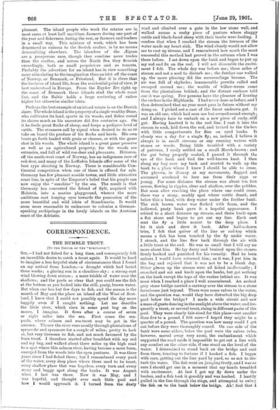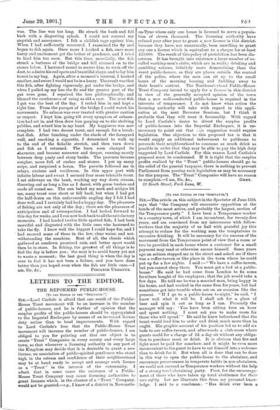CORRESPONDENCE.
THE HUMBLE TROUT.
[To THE EDITOR OF THE "SPECTATOR."]
SIR,—I had not fished for a long time, and consequently felt an incredible desire to catch a trout again. It would be hard to imagine a less hopeful state of circumstances than I found on my arrival from London,—a drought which had lasted three weeks; a glaring sun in a cloudless sky ; a strong east wind blowing down stream ; a mere trickle of water over the shallows ; and the pools so clear that you could see the fish at the bottom as you looked into the still, peaty, brown water. But when one has but few days to fish, and the season is the month of May and the place an island off the West of Scot- land, I knew that I could not possibly spend the day more happily even if I caught nothing. Let me describe the little river, which rises in some peat bog on the moors, I imagine. It flows after a course of seven or eight miles into the sea. First come the sea- pools, where salmon and sea-trout may be got in the autumn. Thence the river runs mostly through plantations of spruce-fir and sycamore for a couple of miles ; pretty to look at, but very tiresome to fish, and not much favoured by the burn trout. I therefore started after breakfast with my rod and my bag, and walked about three miles up the high road to a spot where this salmon river, having become a mere burn, emerged from the woods into the open pastures. It was three years since Iliad fished there ; but I remembered every yard of the water, every deep place where there used to be trout, every shallow place that was hopeless, every turn and every stony and boggy spot along the banks. It was August when I last was there. Now it was May, and I was hopeful, and thought over each little pool and how I would approach it. I turned from the dusty road and climbed over a gate in the low stone wall, and walked across a rushy piece of pasture where shaggy cattle and black-faced sheep with their lambs were feeding. I confess that when I reached the stream the lowness of the water made my heart sink. The wind clearly would not allow me to cast up stream, and I remembered how much the most successful this method had proved in the autumn when I was there before. I sat down upon the bank and began to put up my rod and fix on the reel. I will not dissemble the excite- ment I felt. The whole day was before me ; three miles of stream and not a soul to disturb me ; the further one walked up, the more pleasing did the surroundings become. The air was full of skylarks ; innumerable peewits called and swooped around me ; the warble of 'willow-wrens came from the plantations behind; and the distant cuckoos told one it was spring. Few persons have the pleasure of hearing the cuckoo in the Highlands. I had never done so before, and I then determined that no year must pass in future without my doing so. I picked out a cast of the finest undrawn gut. It was an old one, which had seen use but seemed sound enough; and I always hate to embark on a new piece of curly, stiff gut. Having knotted it to the reel line, I cast it into the stream to soak, laid down the rod, and turned to the tin-box with little compartments for flies on eyed hooks. It clearly was a day for a single fly; as, indeed, I believe it always is in small streams or any running waters with stones or weeds. Being little troubled with a variety of patterns, I easily settled on a small March-brown : and the gut being properly soaked, I passed it through the eye of the hook and tied the well-known knot. I then slung my bag over my back and started to walk up the bank to a place where I knew I should be able to cross. The plovers, in dismay at my movements, flapped and screamed overhead to lure me from their eggs or young. For some distance the stream was about ten feet across, flowing in ripples, clear and shallow, over the pebbles. But soon after reaching the place where one could cross, there was a stony, muddy spot where cattle drank, and below this a bend, with deep water under the further bank. The rich brown water was flecked with foam, and the hollowed, peaty bank gave it a hopeful appearance. I retired to a short distance up stream, and there knelt upon a flat stone and began to get out my line. Each cast sent the fly a little nearer to the deep place. I let it sink and drew it back. After half-a-dozen tries, I felt that quiver of the line or rod-top which means a fish has been touched by the fly under water. I struck, and the line flew back through the air with a little trout at the end. He was so small that I will say no more about him. He lay dusty and bruised upon he stones, firmly hooked and punished for his voracity. Had he be-en unhurt I would have returned him; as it was, I put him in the bag and rejoiced that it was not to be a blank day. Other places up the stream were all fished ineffectually ; I crouched and sat and knelt upon the banks, but got nothing on the hook except the tops of the rushes behind me. It was noon when I reached a place I well remembered. An arched grey stone bridge carried a cartway over the stream to a stone farmhouse just beyond. There were some calves in the water, and the question was, would they have disturbed the big deep pool below the bridge ? I made a wide circuit and saw a mass of gnats dancing in the sunlight above the water, and fre- quently a trout, or several trout, rising in different parts of the pool. They were clearly fair-sized for this place—not smaller than five to a pound, I felt sure—I hoped they might be a quarter of a pound. The question was how many could I get out before they were thoroughly scared. On one side of the bank were some alders, below the pool were the calves (who, however, moved away very soon), the embankment which supported the road made it impossible to get out a line with any comfort on the other side, if one stood on the level of the water. I determined to stand back on the bridge and cast from there, trusting to fortune if I hooked a fish. I began with care, getting out the line yard by yard, so as not to dis- turb the water. The fish went on jumping freely, and I was so sure I should get one in a moment that my hands trembled with excitement. At last I got my fly down under the bushes, and a fish took it greedily and was hooked. I hastily pulled in the line, through the rings, and attempted to swing the fish on to the bank below the bridge. .Ah ! fool that I
was. The line was too long. He struck the bank and fell back with a disgusting splash. I could not conceal my anguish and annoyance. I felt a childish rage against him. When I had sufficiently recovered, I examined the fly and began to fish again. Once more I hooked a fish, once more hurry and excitement got the better of prudence, and I tried to land him too soon. But this time, mercifully, the fish struck a buttress of the bridge and fell stunned on to the stones below. I hastened round to secure him, to wash off the dust, to admire his red spots and beautiful shape, and to lay him to rest in my bag. Again, after a moment's interval, I hooked another, and swore I would not be in a hurry. The result was that this fish, after fighting vigorously, got under the bridge, and when I pulled up my line the fly and the greater part of the gut were gone. I repaired the loss philosophically, and blamed the carelessness of using so old a cast. The next fish I got was the best of the day. I reeled him in and kept a tight line. From the parapet of the bridge I could watch his movements. No salmon was ever treated with greater caution or respect. I kept him going till every symptom of exhaus- tion had set in, and then drew him gasping on to the shelving pebbles, and seized him in my hand. My happiness was now complete. I had two decent trout, and enough for a break- fast dish. After lunching under the shade of the farmyard wall, and smoking a cigarette, I determined to walk up to the end of the fishable stretch, and then turn down and fish as I returned. The burn soon changed its sharacter, and became narrower and deeper, running mostly between deep peaty and stony banks. The pastures became rougher, more full of rushes and stones. I put up many snipe, and surprised a heron. The peewits followed me in relays, anxious and vociferous. In this upper part with infinite labour and sweat I secured four more tolerable trout. I sat sideways on the bank, working my way down stream, throwing out as long a line as I dared, with gorse bushes and reeds all round me. The sun baked my neck and midges bit me, many trout rose short or fell back, but when I had got the lialf-dozen on this unfavourable angling day I felt I had done well, and I certainly had had a happy day. The pleasures of fishing are not only of the day ; there are the pleasures of anticipation and of retrospection. I had looked forward to this day for weeks, and I can now look back to all the satisfactory moments. I bad landed twelve little spotted fish; I had been merciful and disgusted with the little ones who hastened to take the fly. I knew well the biggest I could hope for, and I had secured some of these in the low, clear water, and not- withstanding the sunshine. Best of all, the clouds which gathered at sundown promised rain, and better sport would then be in store. In fishing, the greatest of all things is to feel the day is before you ; the next is to avoid hurry yet not to waste a moment ; the last good thing is when the day is over to feel it has not been a failure, and you have done better than you hoped even when the fish are little ones.—I





















































 Previous page
Previous page